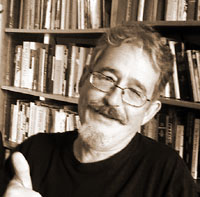There was one of those rowdy discussions about literature at a corner cafe habitats for under employed bohemians where the topic of fiction took a hard left turn, when an aesthetic difference became warfare, a conflict of moral philosophies. I was defending postmodern novelists like Don DeLillo and David Foster Wallace for the way they were helping blur and otherwise erode the
barriers that separated fiction-making and reportage, and a woman who'd been in talk suddenly clenched her fist, gritted her teeth, and gave a stare worth of a mackerel facing you down from a cutting board. To paraphrase crudely, her point was that the antics of postmodern writers gave her a loathing sensation she couldn't stand to have; her world was shaken, disturbed. She said she couldn't have the barriers between reason and emotion so disturbed and suggestively destroyed. She went about her business and left the table, and the cafe. I never saw her again, and side step having conversations about half-grasped literary theories with people I've met only that night. It takes so few assertions to undermine a pleasant evening.The convolution of reason and emotion is exactly the kind of writing literature ought to be engaged in however severe the psychic toll adds up to. If there is no risk to the reading or a dull edge to the narrative, the story is a waste of time. Literature is provocative in the best situations, where style and innovation match and afford the author a means to dwell over the lives of characters who have ambiguous notions of what path to take; heroic, or self-preserving, brave, or cowardly, virtuous, or slippery in ethical and moral principal. It's a tour of the grey areas of existence. Being neither philosophy nor a science of any stripe, fiction is perfectly suited for writers to mix and match their tones, their attitudes, their angles of attack on a narrative schema in order to pursue as broad, or as narrow, as maximal or minimal a story they think a rendering requires.
The attack on modernism's' arrogance that it was the light to the "real" beneath the fabrications that compose our cosmology, is grossly over stated, it seems, vastly over regarded: Pound, Eliot, Joyce, and Stein, arguably literary modernism's Gang-Of-Four, did not, I think, tell us in any specified terms exactly what that true reality was, or what it was supposed to be, but only that the by dicing up, challenging, making it strange and making it new could we challenge ourselves, as artists, and as readers that new perceptions, and new ideas about the nature of the world could be had.Individually , each writer had a different idea of heaven that they wanted the world to become--Pound was ultimately a befuddled, albeit fascist sympathizer, and Eliot became a conservative Royalist (and their anti-Semitism is problematic for anyone looking for real-time heroes)-- but so far as the principle thrust of their work, which was away from the straight jacket of accumulated literary history and toward something new and different that renewed the possibility of art to engage the times in an aesthetically relevant manner, is scarcely diminished in power merely because it came before. I agree with Fred Jameson on the point that Post Modernism , in effect, is a restating of the modernist project which is, in a cramped nutshell, a set of overlapping trends in cultural thinking and expression that countered the conceit that there is a contiguous and coherent way of interpreting the world. After two world wars , discontinuity was the rule, and the ground was set for constructing new ways of seeing the world, as was the cataclysmic optimism that something final and perfect could be made from the ashes. Postmodernism's particular twist was there was no end to historical development and that history was merely a processing of events through convenient fictions. Beyond that, the style of the literary expression hasn't much altered. The key difference seems to be that brand name have replaced place names.
Writing is an argument so far that the central impulse to write at all is to make a series of statements about oneself and one's experiences in the world , and reach a satisfying conclusion, some "meaning" at the end of the discourse.As Barthes noted, the effort to achieve fixed meaning is doomed, as experience is not an static event, but a fluid movement through time that a writer's perception of changes moment to moment, text to text. The argument is thus not one sided, but multi-vocal, complex, interwoven within perceptions that argue amongst themselves within in the writer and onto their pages, in the extension of characters, plot, instances, local, active bits of imagining where the goal, is finally to attempt to resolve contradiction, arrive at something absolute in a universe that seems to permanently with hold its Absolute Meanings during this lifetime, and to achieve, somehow, some peace, some satisfaction. But no: the argument persists, the imagination soars, the old certainties cannot contain either the unset of new perceptions, nor can sooth a writer's innate restlessness. In literature, the conflation continues, reason and emotion color each other, the eyes shut, hoping for vision, a clear path, but the writing continues, the sorting through of experience continues, the unease continues, the world changes radically and not at all. That post modernism's over all mission is to notify us of the limitations of our tropes, our schemes, and our rhetoricized absolutes seems redundant to what literature already does.


